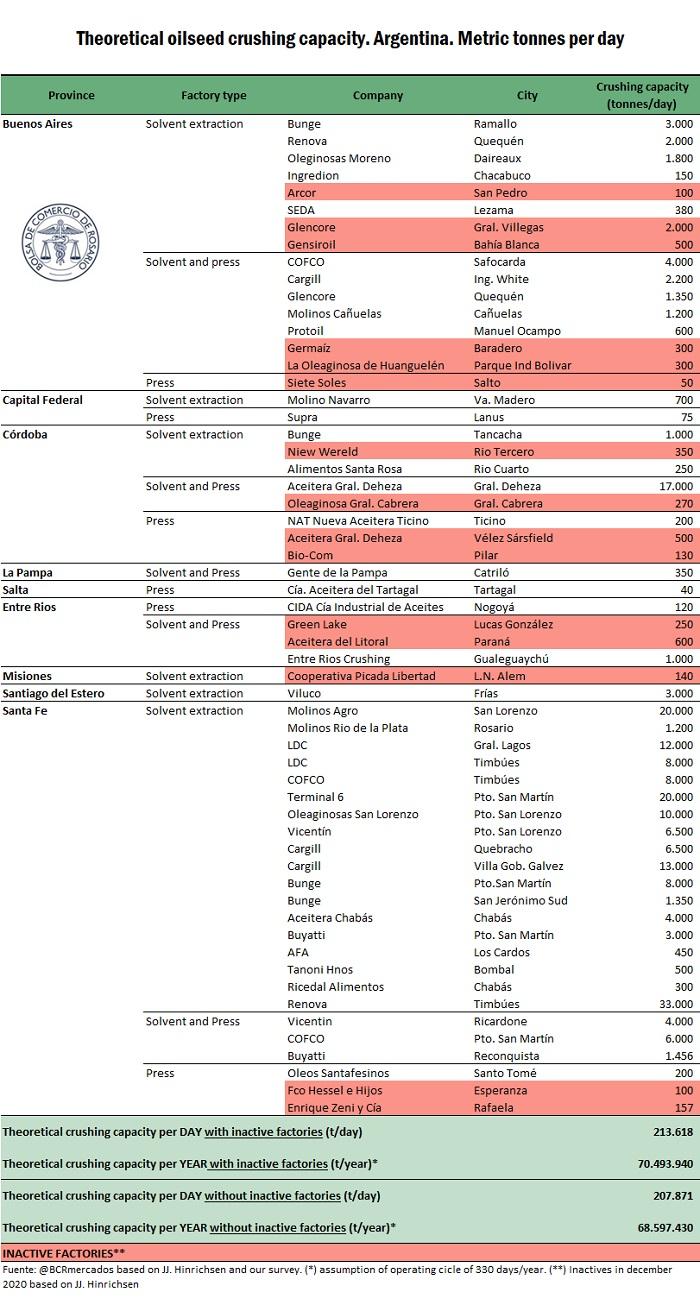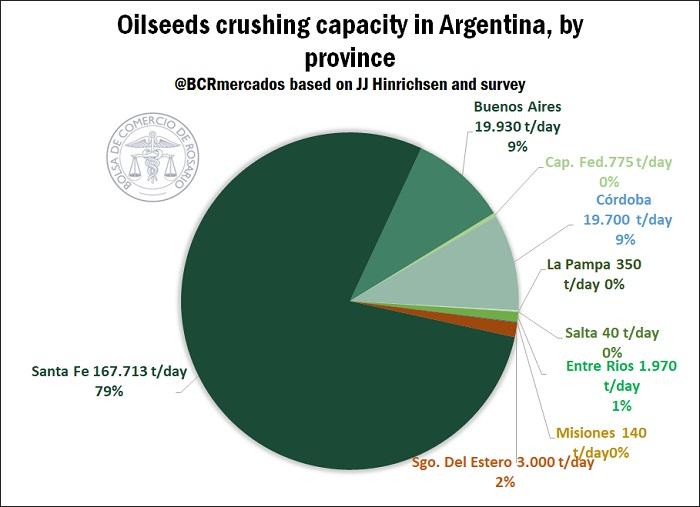Rosario hub concentrates 80% of the country's oilseed crush capacity
The oil industry, which has managed to consolidate in our country since the end of the last century until today, currently appears as one of the fundamental pillars of the national productive apparatus, mainly in terms of exports, but also of great importance in production, employment and value addition. Argentina ranks third in terms of volume in agribusiness exports worldwide, only behind the US and Brazil according to the Food and Agriculture Organization of the United Nations (FAO), although in oilseed processing by-products it is ranked number one. In fact, for soybean meal and oil, our country has long consolidated its leadership position. In the case of sunflower meal and oils, Argentina is usually in the third place on the podium.
The industrialization of oilseeds, mainly soybean, has allowed our country to stop being fundamentally an exporter of primary goods -grains- in recent decades to become a world reference in the trade of agricultural manufacturing (AM). As a matter of fact, only soybean meal (and pellets) and oil exports accounted for approximately US$ 2 of every US$ 10 that entered the country for exports in 2020, totalling foreign sales for US$ 11,700 million in that year. The oilseed sector as a whole, including other complexes such as sunflower and peanut, account for approximately a third of the national exportable balance, with US$ 16,730 million in exports only last year.
FACT N° 1: Argentina has 344 industrial oil plants, 15 solvent extraction plants and 329 pressing-extruding plants
Argentina currently has 344 industrial oil plants according to information from the Single Registry of Operators of the Agribusiness Chain (RUCA, for its Spanish acronym), considering both solvent extraction plants (15 plants) and plants that use the pressing-extruding method (329 plants).
Taking the plants with greater processing capacity and whose information is available, according to data collected from the Directorate of Information and Economic Studies of the Stock Exchange and data provided by the Broker-Broker J.J. Hinrichsen S.A., our country has a total installed capacity (active and inactive plants) to process 213,600 tons of oilseed per day, which corresponds to almost 70.5 million tons per year, far exceeding the total production of the main oilseed crops of the country (soybean, sunflower, canola, among others).
FACT N° 2: Our country has an installed capacity to process 213,600 daily tons of oilseed, which corresponds to 70.5 million tons per year.
The oilseed processing industry in Argentina has an installed capacity of 70.5 million tons per year, considering both active and inactive plants. If we only count the active plants, the national crushing capacity is of 207,870 tons per day, about 68.6 million tons per year, based on an operating cycle of 330 days a year.
Oilseed industrialization plants in our country are strongly concentrated in Rosario hub. This is due both to natural factors and human investments. An element of great relevance is the proximity of production to this area; approximately 64% of Argentina's soybean production, the main locally industrialized crop, is found within a 300 km radius of the port factories that surround Rosario. At the same time, the topographical benefits that the Paraná river muddy banks present at these latitudes for the bulk cargo of the vessels, and the works for deepening the navigable channel that allowed to start loading vessels of greater draft, ended up configuring an environment more than suitable for the installation of these mega-factories. The number of factories installed and the oilseed processing capacity that exists concentrated in an area of this size makes Rosario hub the most important oilseed industrial complex in the world. The great productive scale, the closeness of production and the location ease for exporting give the sector a great strength and competitiveness on an international level.
FACT N° 3: The 20 crushing plants located in Rosario export node account for 80% of the country's crushing capacity. The largest oilseed agribusiness export hub in the world is located in this area.
In the area of influence of Rosario Metropolitan Area there are 20 soybean and sunflower processing factories, 12 of which have port facilities for the dispatch of products derived from their industrialization. These plants have really different processing capacities, ranging from 500 tons per day in the smallest plants to a maximum of 33,000 tons per day in the largest. Likewise, not all plants generate a product destined for export markets, with the smaller and Mediterranean plants mainly focused on supplying the domestic market. 85% of the crushing and industrialization capacity of this area is in plants with a port on the Paraná river, and only 15% is in processing-only plants, which accounts for the strong exporting profile of this industrial activity in this area.
According to our latest survey of ports, terminals and factories in the area, the 20 oil factories of Rosario and its area of influence, including plants from nearby towns, such as Chabás or San Jerónimo Sud, concentrate the impressive crushing capacity of 165,800 tons of oilseed per day, operating at top capacity.
FACT N° 4: Rosario hub has plants capable of industrializing 165,800 tons of oilseed per day. 85% of the crushing capacity is found in plants with an annexed port on the Paraná river, and the remaining 15% in processing-only plants.
The plant with the highest daily oilseed processing capacity is Renova in Timbúes; this joint-venture formed in 2007 by Oleaginosa Moreno Hnos. S.A. (now Viterra S.A.) and Vicentin S.A.I.C., has a daily oilseed processing capacity close to 33 thousand tons per day, being the most important in the country. It is followed by the Terminal 6 S.A. plant, owned by Bunge Argentina S.A. and Aceitera General Deheza S.A. in the town of San Martín, with a processing capacity of 20,000 tons of oilseed per day. This same theoretical crushing capacity was reported by the plant of Molinos Agro S.A. based in the town of San Lorenzo, Muelle San Benito. Behind, the Cargill complex in Villa Gobernador Gálvez has the capacity to industrialize 13,000 tons of soybean per day. It is closely followed by the plant of Louis Dreyfus in General Lagos, which can process 12,000 tons of oilseed per day.

